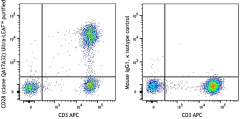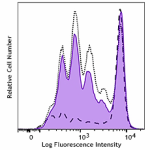- Clone
- QA17A32 (See other available formats)
- Regulatory Status
- RUO
- Workshop
- V-CD28.05
- Other Names
- T44, Tp44
- Isotype
- Mouse IgG1, κ
- Ave. Rating
- Submit a Review
- Product Citations
- publications

-

Human peripheral blood lymphocytes were stained with anti-human CD3 (clone UCHT1) APC and Ultra-LEAF™ purified anti-human CD28 recombinant (clone QA17A32) (left) or Ultra-LEAF™ purified mouse IgG1, κ isotype control (right), followed by anti-mouse IgG PE. -

Human peripheral blood T cells isolated from PBMCs using the MojoSort™ Human CD3 T Cell Isolation Kit (Cat. No. 480021) were labeled with CFSE (Cat. No. 423801), then stimulated with plate-bound Ultra-LEAF™ purified anti-human CD3 (clone UCHT1) and Ultra-LEAF™ purified anti-human CD28 recombinant (clone QA17A32) (filled histogram), Ultra-LEAF™ purified anti-human CD28 (clone CD28.2) (open dotted histogram), or Ultra-LEAF™ purified mouse IgG1, κ isotype control (open dashed histogram) for 4 days. Data shown are gated on CD4+ cells.
| Cat # | Size | Price | Save |
|---|---|---|---|
| 377303 | 100 µg | ¥18,260 | |
| 377304 | 1 mg | ¥24,740 |
CD28 is a 44 kD disulfide-linked homodimeric type I glycoprotein. It is a member of the immunoglobulin superfamily and is also known as T44 or Tp44. CD28 is expressed on most T lineage cells, NK cell subsets, and plasma cells. CD28 binds both CD80 and CD86 using a highly conserved motif MYPPY in the CDR3-like loop. CD28 is considered a major co-stimulatory molecule, inducing T lymphocyte activation and IL-2 synthesis, and preventing cell death. In vitro studies indicate that ligation of CD28 on T cells by CD80 and CD86 on antigen presenting cells provides a costimulatory signal required for T cell activation and proliferation.
Product DetailsProduct Details
- Verified Reactivity
- Human
- Reported Reactivity
- Cynomolgus, Rhesus, Baboon, Capuchin Monkey, Chimpanzee, Pigtailed Macaque, Sooty Mangabey, Squirrel Monkey
- Antibody Type
- Recombinant
- Host Species
- Mouse
- Formulation
- 0.2 µm filtered in phosphate-buffered solution, pH 7.2, containing no preservative.
- Endotoxin Level
- Less than 0.01 EU/µg of the protein (< 0.001 ng/µg of the protein) as determined by the LAL test.
- Preparation
- The Ultra-LEAF™ (Low Endotoxin, Azide-Free) antibody was purified by affinity chromatography.
- Concentration
- The antibody is bottled at the concentration indicated on the vial, typically between 2 mg/mL and 3 mg/mL. To obtain lot-specific concentration and expiration, please enter the lot number in our Certificate of Analysis online tool.
- Storage & Handling
- The antibody solution should be stored undiluted between 2°C and 8°C. This Ultra-LEAF™ solution contains no preservative; handle under aseptic conditions.
- Application
-
FC - Quality tested
Costim - Verified - Recommended Usage
-
Each lot of this antibody is quality control tested by immunofluorescent staining with flow cytometric analysis. For flow cytometric staining, the suggested use of this reagent is ≤ 1.0 µg per million cells in 100 µL volume. It is recommended that the reagent be titrated for optimal performance for each application.
- Application Notes
-
Clone QA17A32 completely blocks binding of parental clone.
Clone QA17A32 activates human T cells in co-stimulation assay with CD3 as efficiently as the parental clone. -
Application References
(PubMed link indicates BioLegend citation) -
- Schlossman S, et al. Eds. 1995. Leucocyte Typing V Oxford University Press New York.
- Nunes J, et al. 1993. Biochem J. 293:835.
- Calea-Lauri J, et al. 1999. J Immunol. 163:62.
- Tazi A, et al. 1999. J Immunol. 163:3511. (IHC)
- Marti F, et al. 2001. J Immunol. 166:197. (Costim)
- Jeong SH, et al. 2004. J Virol. 78:6995. (Costim)
- Rivollier A, et al. 2004. Blood. 104:4029. (Costim)
- Scharschmidt E, et al. 2004. Mol Cell Biol. 24:3860. (Costim)
- Sheng W, et al. 2007. Elsevier. 580:6819. PubMed
- Mitsuhashi M. 2007. Clin Chem. 53:148. PubMed
- Ye Z, et al. 2008. Infect Immun. 76:2541. PubMed
- Magatti M, et al. 2008. Stem Cells. 26:182. (FA) PubMed
- Yoshino N, et al. 2008. Exp Anim. (Tokyo) 49:97. (FC)
- Berg M, et al. 2008. J Leukoc Biol. 83:853. (IP) PubMed
- Rout N, et al. 2010. PLoS One. 5:e9787. (FC)
- Leonard JA, et al. 2011. J Virol. 85:6867. PubMed
- Nomura T, et al. 2012. J Virol. 86:6481. PubMed
- RRID
-
AB_3097460 (BioLegend Cat. No. 377303)
AB_3097460 (BioLegend Cat. No. 377304)
Antigen Details
- Structure
- Ig superfamily, type I transmembrane glycoprotein, homodimer, 44 kD
- Distribution
-
Mature T cells, thymocytes, NK cell subsets, plasma cells, EBV-positive B cells
- Function
- T cell costimulation
- Interaction
- B cells, NK cells, Plasma cells, T cells, Thymocytes, Tregs
- Ligand/Receptor
- CD80, CD86
- Cell Type
- T cells, Thymocytes
- Biology Area
- Costimulatory Molecules, Immunology
- Molecular Family
- CD Molecules
- Antigen References
-
- Schlossman S, et al. Eds. 1995. Leucocyte Typing V Oxford University Press New York.
- June CH, et al. 1994. Immunol Today. 15:321-31.
- Linskey PS, et al. 1993. Annu Rev Immunol. 11:191-212.
- Gene ID
- 940 View all products for this Gene ID
- UniProt
- View information about CD28 on UniProt.org
Related FAQs
- Do you guarantee that your antibodies are totally pathogen free?
-
BioLegend does not test for pathogens in-house aside from the GoInVivo™ product line. However, upon request, this can be tested on a custom basis with an outside, independent laboratory.
- Does BioLegend test each Ultra-LEAF™ antibody by functional assay?
-
No, BioLegend does not test Ultra-LEAF™ antibodies by functional assays unless otherwise indicated. Due to the possible complexities and variations of uses of biofunctional antibodies in different assays and because of the large product portfolio, BioLegend does not currently perform functional assays as a routine QC for the antibodies. However, we do provide references in which the antibodies were used for functional assays and we do perform QC to verify the specificity and quality of the antibody based on our strict specification criteria.
- Does BioLegend test each Ultra-LEAF™ antibody for potential pathogens?
-
No, BioLegend does not test for pathogens in-house unless otherwise indicated. However, we can recommend an outside vendor to perform this testing as needed.
- Have you tested this Ultra-LEAF™ antibody for in vivo or in vitro applications?
-
We don't test our antibodies for in vivo or in vitro applications unless otherwise indicated. Depending on the product, the TDS may describe literature supporting usage of a particular product for bioassay. It may be best to further consult the literature to find clone specific information.
Other Formats
View All CD28 Reagents Request Custom Conjugation| Description | Clone | Applications |
|---|---|---|
| Ultra-LEAF™ Purified anti-human CD28 Recombinant Antibody | QA17A32 | FC,Costim |
Compare Data Across All Formats
This data display is provided for general comparisons between formats.
Your actual data may vary due to variations in samples, target cells, instruments and their settings, staining conditions, and other factors.
If you need assistance with selecting the best format contact our expert technical support team.
-
Ultra-LEAF™ Purified anti-human CD28 Recombinant Antibody

Human peripheral blood lymphocytes were stained with anti-hu... 
Human peripheral blood T cells isolated from PBMCs using the...









Follow Us